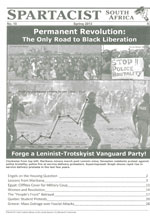
From the Archives of Marxism: “The Housing Question” By Friedrich Engels Below we reprint an excerpt from Friedrich Engels’ pamphlet The Housing Question, written in 1872. In this work Engels provides a Marxist analysis of the wretched housing conditions of the working class which still resonates today. This is especially so in Gauteng where there has been a rapid growth of squatter camps. According to the 2011 census, the population of Johannesburg increased by 1,2 million people between 2001 and 2011. And the Apartheid land redistribution has not changed much today, with the black majority still overwhelmingly landless. Things are so stark that even Trevor Manuel, Minister in the Presidency, hypocritically acknowledged it. Speaking at an annual conference of mayors and property speculators in Sandton, Manuel noted, “Even people who hold formal jobs battle to live in our cities. The poor tend to live in marginal land, in unplanned areas that are consequently poorly serviced; distances are huge and transport costs expensive.” As Engels explained more than 140 years ago, the solution of the housing question requires the expropriation of the bloodsucking landlords as part of the overthrow of the whole capitalist profit system. Whence the housing shortage then? How did it arise? As a good bourgeois, Herr Sax is not supposed to know that it is a necessary product of the bourgeois social order; that it cannot fail to be present in a society in which the great labouring masses are exclusively dependent upon wages, that is to say, upon the quantity of means of subsistence necessary for their existence and for the propagation of their kind; in which improvements of the machinery, etc., continually throw masses of workers out of employment; in which violent and regularly recurring industrial fluctuations determine on the one hand the existence of a large reserve army of unemployed workers, and on the other hand drive the mass of the workers from time to time on to the streets unemployed; in which the workers are crowded together in masses in the big towns, at a quicker rate than dwellings come into existence for them under the prevailing conditions; in which, therefore, there must always be tenants even for the most infamous pigsties; and in which finally the house-owner in his capacity as capitalist has not only the right but, by reason of competition, to a certain extent also the duty of ruthlessly making as much out of his property in house rent as he possibly can. In such a society the housing shortage is no accident; it is a necessary institution and can be abolished together with all its effects on health, etc., only if the whole social order from which it springs is fundamentally refashioned. That, however, bourgeois socialism dare not know. It dare not explain the housing shortage as arising from the existing conditions. And therefore it has no other way but to explain the housing shortage by moralising that it is the result of the wickedness of man, the result of original sin, so to speak. |
||||||||||||
